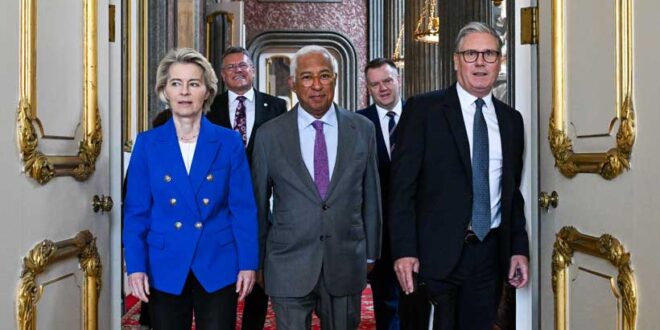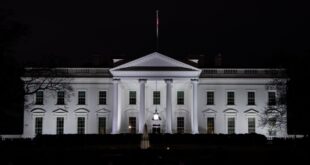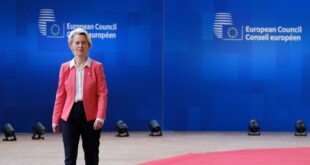The escalating humanitarian catastrophe in Gaza has galvanized unprecedented diplomatic rebukes from European and British leaders, signalling a potential turning point in international responses to the Israeli-Palestinian conflict. Ireland’s Deputy Prime Minister, Simon Harris, and the UK’s newly appointed Foreign Secretary, David Lammy, have emerged as vocal critics of Israel’s military operations, denouncing the disproportionate use of force and the systemic obstruction of aid. Their condemnations reflect a growing impatience with Israel’s defiance of international law and a moral awakening among Western powers historically hesitant to challenge Israeli policies. As Gaza’s civilian toll surpasses alarming thresholds, these calls for accountability underscore the urgency of transforming rhetoric into tangible action.
Harris, echoing Ireland’s longstanding solidarity with Palestine, labelled Israel’s bombardment of Gaza as “indiscriminate and unconscionable,” urging the European Union to leverage its political and economic influence to demand an immediate ceasefire. Similarly, Lammy condemned the blockade exacerbating Gaza’s humanitarian collapse, stating, “Starving civilians as a tactic of war is a grotesque violation of humanity.” Their statements align with a broader shift within the EU, where nations like Spain, Belgium, and Norway are pushing for stricter sanctions and multilateral measures to hold Israel accountable. This coalescing European stance contrasts starkly with the muted responses from other global powers, revealing a fractured international consensus.
At the heart of this crisis lies an imminent humanitarian disaster: over 14,000 Palestinian infants and children face catastrophic malnutrition and preventable deaths within 48 hours if aid remains obstructed. Hospitals, devoid of electricity and supplies, are unable to treat casualties from relentless airstrikes, while UN agencies report that 90% of Gaza’s population is displaced and food insecure. The World Health Organization warns of a “public health apocalypse” as diseases spread amid overcrowded shelters and contaminated water. Despite intermittent aid deliveries, Israel’s restrictions on fuel and medical equipment have rendered relief efforts insufficient. Lammy’s demand for “unfettered humanitarian access” underscores the life-or-death urgency, yet diplomatic appeals have thus far failed to dismantle the blockade.
Legal experts and human rights organizations increasingly categorize Israel’s actions as war crimes. The deliberate targeting of residential areas, schools, and hospitals, documented extensively by international observers, violates the Geneva Conventions, while the siege constitutes collective punishment, prohibited under international law. Pakistan, among other nations, has called for an arms embargo and referral of Israel to the International Criminal Court (ICC), arguing that accountability cannot wait. “The selective application of international law erodes its very foundation,” remarked Pakistan’s Foreign Ministry, condemning Western arms sales to Israel as complicity in genocide. The ICC’s ongoing investigation into potential crimes in Palestine faces political headwinds, but mounting evidence may compel judicial action.
Pakistan has positioned itself as a vocal advocate for Palestinian rights, framing the conflict as a litmus test for global justice. Reiterating its commitment to a two-state solution, Islamabad criticized the “deafening silence” of powerful nations enabling Israeli impunity. “Double standards in addressing occupation and apartheid undermine the credibility of international institutions,” asserted Pakistan’s UN envoy. This critique resonates across the Global South, where parallels are drawn between Palestinian suffering and historical struggles against colonialism. Pakistan’s alignment with Ireland and progressive EU states highlights a strategic effort to isolate Israel diplomatically and amplify grassroots demands for solidarity.
The EU’s recent statements, though significant, risk irrelevance without concrete measures. Sanctions targeting Israeli officials, suspension of trade agreements linked to settlements, and pressure to end the occupation are essential next steps. The bloc’s influence could also expedite Palestine’s UN membership bid, challenging the U.S.-led status quo. However, internal divisions persist, with Germany and Austria resisting punitive measures. The coming weeks will test whether the EU can transcend political fragmentation and embody the “moral leadership” hailed by advocates.
The current violence is rooted in decades of systemic oppression. Reports by Human Rights Watch and Amnesty International accuse Israel of apartheid, citing discriminatory laws, home demolitions, and settlement expansions designed to displace Palestinians. The Nakba of 1948, which expelled 700,000 Palestinians, remains an open wound, perpetuated by policies that fragment communities and deny refugee rights. Lasting peace, argue scholars, requires dismantling this architecture of oppression rather than negotiating temporary ceasefires. South Africa’s post-apartheid transition is frequently invoked as a model, though it demands courageous international solidarity.
The UN Security Council’s paralysis, driven by U.S. vetoes, has exacerbated Gaza’s plight. Resolutions demanding ceasefires and humanitarian pauses have been blocked or diluted, undermining the UN’s credibility. Secretary-General António Guterres’ invocation of Article 99 to highlight Gaza’s peril marked a rare intervention, yet member states remain divided. Reform advocates argue that the Council’s structure, reflecting post-WWII power dynamics, is ill-suited to address modern crises. A renewed push for binding resolutions, backed by grassroots mobilization, may yet break the deadlock.
The coalescing EU-UK stance against Israel’s actions offers a glimmer of hope amid Gaza’s darkness. However, without sustained pressure, diplomatic, economic, and legal, the cycle of violence will persist. The international community stands at a crossroads: uphold a rules-based order or enable further atrocities. For Gaza’s children, the choice is existential.
Following Recommendations
- Enforce an immediate, unconditional ceasefire and ensure unrestricted humanitarian access to Gaza.
- Impose targeted sanctions on Israeli officials and entities involved in human rights violations.
- Suspend arms exports to Israel and advocate for a comprehensive international arms embargo.
- Urge the ICC to expedite investigations into alleged war crimes and apartheid practices.
- Support bilateral recognition of Palestinian statehood and dismantle illegal settlements through trade penalties.
- Reform UN Security Council veto mechanisms to prevent obstruction of critical resolutions.
- Mobilize international aid for Gaza’s reconstruction, conditioned on compliance with international law.
“Our freedom is incomplete without the freedom of the Palestinians.”Nelson Mandela
 Geostrategic Media Political Commentary, Analysis, Security, Defense
Geostrategic Media Political Commentary, Analysis, Security, Defense





